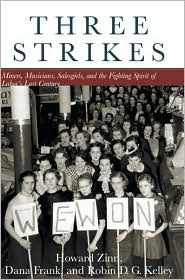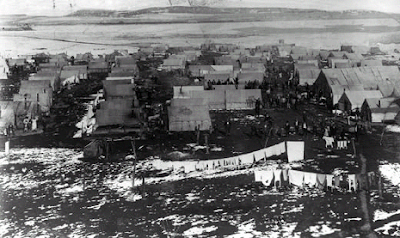
Three Strikes: Miners, Musicians,
Salesgirls, and the Fighting Spirit of Labor's Last Century - Dana Frank, Howard Zinn, Robin D.G. Kelley
This is an interview with the University of California newsroom;
"In the 1930s, Woolworth's Five and Dime was the equivalent of
Wal-Mart today, said Frank. The chain boasted 2,000 stores in five
countries, the company exploited its workers and sold products made
in sweatshops. "There was a whole movement in the 1930s against chain
stores," said Frank. "They were called 'the chain store evil' because
they were wiping out small businesses."

Waitresses at Woolworth's staged an eight-day sitdown strike in 1937, singing, dancing, exercising, doing each others hair and nails until finally management recognized their union and gave them a five-cent per hour pay hike.
The sit-in for higher wages and overtime by 100 salesclerks
gained momentum, and the strikers capitalized on media coverage that
dismissed them as "young girls, blonde, brunette, slim, plump, going
on strike for their rights." The widespread press reports drew
attention to the strikers' cause and prevented Woolworth's executives
from calling for the National Guard. The strikers won all their
demands, and the victory helped set in motion a number of winning
sit-down strikes at department and chain stores across the country.

Ludlow Tent Colony
Zinn, author of the bestselling A People's History of the
United States, tells the grim tale of the conflict in which at least
66 people died, including women and children who were burned to death
in a pit beneath the coal miners' tent colony in southern Colorado.
Although Woody Guthrie wrote a wrenching song about the tragedy, it has been mostly overlooked by historians, noted Zinn.
1913 Massacre by Woody Guthrie (see lyrics below and read it while listening)
"Yet that story has been buried, in the way that labor
struggles in general have been omitted or given brief mention in most
mainstream accounts of the history of the United States," writes
Zinn. "It deserves to be recalled, because embedded in the events of
the Colorado strike are issues still alive today: the class struggle
between owners of large enterprises and their workers, the special
treatment of immigrant workers, the relationship between economic
power and political power, the role of the press, and the way in
which the culture censors out certain historical events."
1913 Massacre
by Woody Guthrie
Take a trip with me in nineteen thirteen
To Calumet, Michigan in the copper country
I'll take you to a place called Italian Hall
And the miners are having their big Christmas ball
I'll take you in a door and up a high stairs
Singing and dancing is heard ev'rywhere
I'll let you shake hands with the people you see
And watch the kids dance 'round the big Christmas tree.
There's talking and laughing and songs in the air
And the spirit of Christmas is there ev'rywhere
Before you know it you're friends with us all
And you're dancing around and around in the hall
You ask about work and you ask about pay
They'll tell you they make less than a dollar a day
Working their copper claims, risking their lives
So it's fun to spend Christmas with children and wives.
A little girl sits down by the Christmas tree lights
To play the piano so you gotta keep quiet
To hear all this fun; you would not realize
That the copper boss thug men are milling outside
The copper boss thugs stuck their heads in the door
One of them yelled and he screamed, "There's a fire"
A lady she hollered, "There's no such a thing;
Keep on with your party, there's no such a thing."
A few people rushed and there's only a few
"It's just the thugs and the scabs fooling you."
A man grabbed his daughter and he carried her down
But the thugs held the door and he could not get out.
And then others followed, about a hundred or more
But most everybody remained on the floor
The gun thugs, they laughed at their murderous joke
And the children were smothered on the stairs by the door.
Such a terrible sight I never did see
We carried our children back up to their tree
The scabs outside still laughed at their spree
And the children that died there was seventy-three
The piano played a slow funeral tune,
And the town was lit up by a cold Christmas moon
The parents, they cried and the men, they moaned,
"See what your greed for money has done?"
©1961 (Renewed) by Fall River Music Inc.
All Rights Reserved.
Check out where ordinary labour rights stand in NAFTA and CAFTA
Happy Labour Day..just remember who still work for blood sweat and tears, don't take it for granted.
When I was a kid, Woolworths was a weekly excursion for my mother and grandmother. I remember getting pet turtles and even alligators from their "pet" area. It was also the place to go for the latest 45rpm singles. And the lunch counter. Wow! They used to have a lot of balloons at the lunch counter. A kid would pick a balloon and the person behind the counter would pop it. Inside was a slip of paper with the price of your banana split. You never knew if it would be 50¢, a quarter, dime, nickel, or penny.
ReplyDeleteBut I never knew about their history - other than the Woolworth building in New York once being the tallest building in the world.
Great memories Robert. I suspet that most American 'succes stories' have an ugly underbelly. After I emigrated here I was appalled to find that their is such an anti-pathy and dismissiveness towards 'labor' and labour issues and unions.. somehow, culturally, people have internalized that wages NEED to be kept low otherwise a company is not competitive. I personally think that that might be true when one starts a company, but not after it's established. Plus, it's all about what your values are. Ben and Jerry's have proven it's possible to pay decent wages and make it. Chick File's religious beliefs make them close down for Sundays and they're still successful. I think ultimately it's all about the product.
ReplyDeleteIt pays to read Howard Zinn's books. That 'people's one is a monster (big big) and it's somewhere packed due to Fall renovations. I need to dig it up and continue it because I suspect that here, the media does not honour these type of stories because I think people would realize, that ultimately, they are still at the mercy of big business and politics.
Ingrid
Great post, chock full of great historical information. I went to the site in southern Colorada once and sat there, the place where they burned out the strikers and their families. It is on the lonesome Colorado prairie. The history of workers in this country is a discouraging one in union terms. The right to work law basically broke the back of union workers back in the 1980s.
ReplyDeleteThank you for raising up these labor stories for our consideration. Yes, they are buried. I only learned the S. Colorado story for the first time this spring when I passed through the area.
ReplyDeleteIt feels like labor rights are on the decline in the US currently. We are in danger of permanently losing the ground that these heroes gained through their sacrifices.
thank you for this.wonderful..all of it- the stories the music ...and a book I want now ;-)
ReplyDeleteThis comment has been removed by a blog administrator.
ReplyDeleteThis comment has been removed by the author.
ReplyDelete